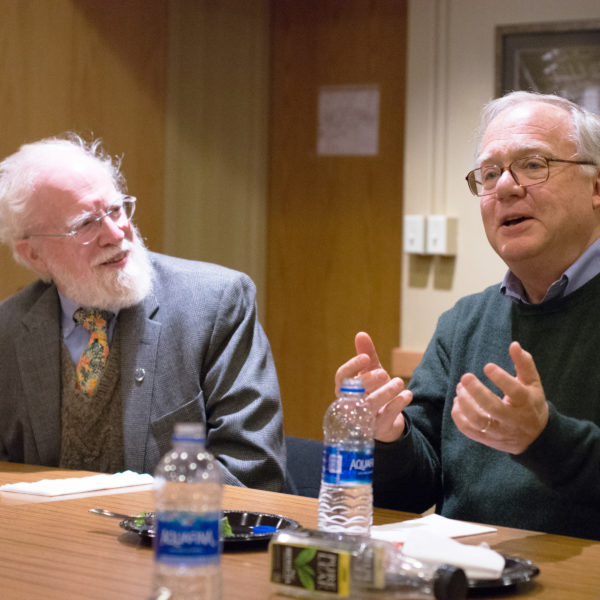
What Can You Do With a Degree in Political Science?
Charles Crow III ’72 and Francis Landrey P’06 both went to law school and became lawyers. On a recent visit to campus as a featured speaker, Crow described himself as a “corporate lawyer with a Wall Street practice.” He told a roomful of students majoring in political science, criminal justice, and one math major, over lunch, that he wanted to be a “trial lawyer” like his co-presenter, Landrey, but added, “my life took me in another direction.” Crow has been self-employed for over 30 years. He is the founding partner at Crow & Cushing, a Princeton, NJ firm representing multinational corporations that specialize in “coffee, sugar, cocoa and cotton.” Crow said he represents “the biggest coffee growers in the world.” He pointed out that he writes “swap agreements” for the coffee we buy at “Starbucks and McDonald’s.”
Landrey, Hartwick College Board Chair, on the other hand, is a “civil litigator” or “trial lawyer.” Before he retired recently, Landrey was senior counselor with Proskauer Rose, LLP in New York City, a 750-lawyer firm with offices in the Paris and London. He has represented clients including the NBA, NHL, major banks, insurance companies, and Honda.
“A law degree is a very versatile degree,” as these two career paths illustrate and as Landrey pointed out. “Writing is a key law career skill,” Landrey said and “law is about contracts.” He told the students that most of his cases were settled out of court and never went to trial. He described his profession as writing very detailed documents and “negotiating the best deal possible….The fastest resolution is always a compromise.” Other traits needed in the legal profession include “thinking on your feet” and “good people skills.”
What do these men have in common?
Both have used their knowledge of the law to help prisoners on a pro-bono basis. Crow has been “fighting to free the convicted innocent” as a member of the board of directors of Centurion, a secular, non-profit organization founded in 1983. Centurion is considered to be the first innocence project in the U.S. Located in Princeton, NJ, Centurion tries to “free and vindicate from prison those who are completely innocent of the crimes for which they have been wrongly convicted and imprisoned for life or death.”
A video of Crow and Landrey speaking on this topic is available on Hartwick’s website.
Crow shared two Centurion videos and many heart-wrenching stories of men and women who are innocent and have been behind bars for 10-30 years or more. The average cost to mount a legal battle for this period of time is $350,000 per prisoner. Centurion operates with a very small staff and many volunteers like Crow. He also shared photos and stories of more than 15 people who were exonerated and released from prison to Centurion’s credit.
Landrey represents a man who has been on death row in a Florida prison for the last 32 years. This man was convicted as an accomplice to a crime in which a woman was killed and he was in the get-away car. Landrey prevented the man from being executed once, but is still fighting to have the man’s sentence reduced and his death penalty conviction reversed.
Landrey said, “Our criminal justice system is one of the best in the world, but it is not perfect.” He said that racial bias is well documented with harsher sentencing and wrongful convictions among black people being noticeably higher than their white counterparts.
Crow explained, “The legal system is an adversarial system. Lawyers want to win their cases. Police Officers want to put someone behind bars.” The system is “run by humans and humans are not perfect.” Crow added, “Despite everything, I have faith in the law.”
Crow was The Leslie G. Rude Memorial Lecture featured speaker on April 10, 2019. Leslie G. Rude was an outstanding Hartwick College faculty member and administrator. Following his death in 1998, Professor Emeritus Norma Hutman and Marion Rude established this lecture series to reflect his passionate interest in political science and public speaking, and his commitment to public life.